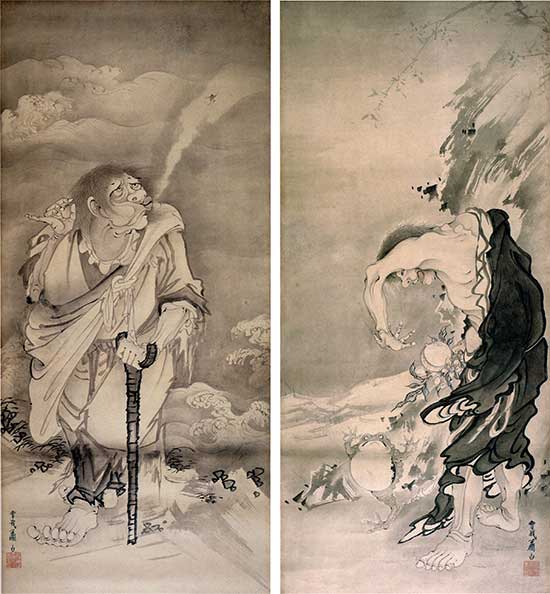The Diamond Sutra — in 300 lines
![]()
The Diamond Sutra
(the discourse on transcendent awareness in 300 lines)
Homage to the beautiful, the sacred transcendent awareness.
1 Introduction
1.a The assembly.
[1] Thus have I heard at one time. The Buddha was in Sravasti, in
the Jeta Grove, in Anathapindada’s park, with a large group of
monks, 1250 monks and many great bodhisattvas. Early in the
morning the Lord Buddha got dressed, took his bowl, and went to
Sravasti for alms. When he had eaten, he returned to the park,
put his bowl and coat away, washed his feet, and sat down on the
seat that had been arranged for him. He crossed his legs, sat
upright, and looked straight ahead. Many monks approached,
saluted his feet, walked around him three times, and sat down to
one side.
1.b Subhuti asks
[2] Then the venerable Subhuti arrived and sat down. After rising
and adjusting his robe, he knelt on one knee and with folded
hands said to the Buddha, “It’s great, oh lord Buddha, it’s
exceedingly wonderful, oh well-traveled one, how much the
bodhisattvas have been benefited by you, who knows where it’s at,
the superior man, the fully enlightened one. It’s great how these
bodhisattvas have been so highly favored by you, the one who
knows where it’s at, the superior man, the fully enlightened one.
How should such favored bodhisattvas behave, proceed, and tame
their thoughts?
The Buddha answered Subhuti, “Good question, good question
Subhuti. You’re right. The one who knows where it’s at has helped
the bodhisattvas, greatly helped them, favored them with the
highest favor. So listen up, Subhuti. I’ll tell you how those who
have set out on the bodhisattva’s way of life should behave,
proceed, and tame their thoughts.”
“So be it, buddha.” replied Subhuti, as he perked up.
2 The bodhisattva’s career
2.a The bodhisattva’s intention
[3] The Buddha said, “Subhuti, a person who has set out on the
bodhisattva’s way of life should think, ‘I must lead all the
beings of the universe to nirvana, whether they are born from an
egg, from a womb, from scum, or they miraculously appear; I must
lead them into nirvana where nothing remains behind. And yet,
although innumerable beings have been thus led to nirvana, no
being whatsoever has been led to nirvana.’
Why is that? If a bodhisattva thinks of a ‘being’ he or she
is no bodhisattva. Why is that? He or she is no bodhisattva if
they think in terms of a self or a being, or in terms of a living
person or a soul.”
[4] “Moreover, Subhuti, a bodhisattva who shares with others
should free themselves. When sharing, they should be free from
lust for beautiful sights, lovely sounds, gourmet tastes or
smells, tactile enjoyments, and seductive thoughts. The
bodhisattva should give to others without being influenced by
seductive things. Why is that? Because a bodhisattva who shares
uninfluenced by such things will reap vast benefits.
“What do you think, Subhuti? Can you comprehend the vastness
of space to the east?”
“No, blessed one! It is impossible to comprehend the
vastness of space in the east.”
“Subhuti, is it possible to comprehend the limits of space
in the north, the south, or the west? Or any direction in the
universe?”
“No, world-honored one.”
“Subhuti, it is equally impossible to comprehend the vast
benefits that incur to a bodhisattva who shares without being
seduced by appearances.”
[5] “What do you think, Subhuti? Can someone see the well-
traveled one in the phenomena of physical presence?”
“No, honored one! It is impossible to even see the well-
traveled one in the phenomena of his physical presence. Why?
Because the phenomena of his physical presence is not the same as
the essential well-traveled one.”
“You are right, Subhuti. The phenomena of the physical
presence is wholly illusion. It is not until a person understands
this that he can realize the true well-traveled one.”
[6] Subhuti respectfully asked the lord buddha, “Honored one! In
the future, if a person hears this teaching, or a part of it,
whether a section or a sentence, will true faith awaken in their
mind?”
“No doubt about it, Subhuti. Even 500 years after the
nirvana of the well-traveled one there will be some who,
practicing charity and keeping the faith, will believe in
sections and sentences of this scripture and will awaken their
minds purely. Know, however, that such persons, long ago, planted
seeds of goodness, not simply before one buddhist temple, or two,
or five, but before hundreds of thousands of buddhas, so that
when they hear sections and sentences of this scripture a pure
faith will awaken within their minds.
“Subhuti, the well-traveled one knows that the sentient
beings who awaken faith upon hearing sections or sentences of
this scripture will accumulate inestimable blessings and merit.
How do I know this? Because these sentient beings must have
already discarded such arbitrary conceptions of phenomena as
one’s own self, other selves, living beings, and a universal
self. If they had not, their minds would inevitably grasp after
such things and they would then not be able to practice charity
nor keep the precepts.
“Moreover, these sentient beings must also have discarded all
arbitrary notions of a personal self, other personalities, living
beings, and a universal self. Otherwise their minds would
inevitably grasp after such relative conceptions. Furthermore,
these sentient beings must have already discarded all arbitrary
notions of the non-existence of a personal self, other
personalities, living beings, and a universal self. Otherwise,
their minds would still be grasping at such notions. Therefore
everyone who seeks total enlightenment should discard not only
conceptions of their own selfhood, other selves, living beings,
and a universal self, but they should also discard all notions of
the non-existence of such conceptions.
When the well-traveled one, in teaching, uses conceptions
and ideas, people should remember the unreality of all such
concepts and ideas. They should recall that the well-traveled
one, in teaching spiritual truths, always uses such notions in
the way that a raft is used to cross a river. The raft is of no
more use when the river has been crossed, and should be
discarded. So these arbitrary conceptions of and about spiritual
things should be given us as one attains enlightenment. How much
more should one give up conceptions of non-existent things?”
[7] “What do you think, Subhuti? Has the well-traveled one
attained anything that can be described as complete
enlightenment? Has he ever given you any such teaching?”
Subhuti replied, “As I understand the teaching of the lord
buddha, there is no such thing as complete enlightenment, nor is
it possible for the well-traveled one to teach any fixed
spiritual truth. Why? Because the things taught by the well-
traveled one are, in their essential nature, inconceivable and
inscrutable; they are neither existent nor non-existent; they are
neither phenomena nor noumena. What does this mean? It means that
buddhas and bodhisattvas are not enlightened by fixed teachings,
but by an intuitive process, spontaneous and natural.”
[8] “What do you think Subhuti? If a follower gave treasures
enough to fill 3,000 universes, would that person gain
considerable blessings and merit?”
Subhuti replied, “Considerable blessings and merit. Why?
Because what the lord buddha has referred to as blessings and
merit does not refer to anything objective, he merely refers to
such things in a relative way.
The lord buddha continued, “If another, after studying and
observing even a single stanza of this scripture, explains its
meaning to others, their blessings and merit will be much
greater. Why is that? Because from explanations such as these
buddhas have attained unsurpassed enlightenment, and their
teachings come from this sacred scripture. However, Subhuti, I
must take back my words as soon as they are uttered, for there
are no buddhas and no teachings.”
[9] “What do you think, Subhuti? Suppose someone has entered the
flow. Could that person arbitrarily say, ‘I have entered the
flow’?”
Subhuti replied, “No way man. Because, even though they have
entered the flow, truly they have not entered anything, nor has
their mind entertained such arbitrary conceptions as form, sound,
taste, odor, tactile thing, or discrimination. Thus are such
people known to have entered the flow.”
“What do you think, Subhuti? Suppose someone has only one
more life to traverse? Could that person say ‘I have only one
more life to go’?”
“No way man. Because even if set to return only one more
time, truly there is no rebirth either in this world or any
other. By knowing this someone has only one more life to
traverse.”
“What do you think Subhuti? Suppose someone will never be
reborn. Could that person say, ‘I won’t be reborn again’?”
“No way man. Because even though they won’t be reborn, they
don’t really think in such arbitrary terms. Because of which they
won’t be reborn again.”
“What do you think, Subhuti? Suppose someone is completely
awake. Would that person think, ‘I am awake’?”
“No way man. Because there really isn’t such a thing as a
truly awakened person. If someone harbored a thought such as ‘I
am awake’ they would find themselves attached to ideas about a
self, other selves, living beings, and a universal self. Oh Lord,
you have said that I have become passively atuned, have reached
the pinnacle of my potential, and am therefore awakened. If I
cherished the thought, ‘I am awake, free of desire!’ you, good
lord, would not have said that I delight in the practice of
silence and tranquility. But, in truth, I have cherished no such
arbitrary thought, so you could truly say, ‘Subhuti delights in
the practice of silence and tranquility.”
[10] “What do you think, Subhuti? When the well-traveled one was,
in a previous life, with Dipankara buddha, did I receive any
definite teaching or attain any definite degree of self-control,
whereby I later became a buddha?”
“No, honorable one. When the well-traveled one was a
disciple of Dipankara buddha, in truth, he received no definite
teaching, nor did he attain any definite supremacy.”
“What do you think, Subhuti? Do the great bodhisattvas
embellish the elysian fields to which they go?”
“No way man. And why is that? Because what you mean by the
expression, ’embellish the elysian fields’ is self-contradictory,
for elysian fields thus embellished would no longer be called
elysian fields. Therefore the expression ’embellishment of the
elysian fields’ is merely a figure of speech.”
The lord buddha continued, “Therefore, Subhuti, the minds of
all bodhisattvas should be purified of all thoughts that relate
to seeing, hearing, tasting, smelling, touching, and
discriminating. They should use their mental faculties
spontaneously and naturally, without being constrained by
preconceived notions arising from the senses.
“Subhuti, suppose a person’s body was as big as the highest
mountain. What do you think? Would that body be considered huge?”
“Exceedingly huge, world-honored one! Because what you
really mean by the expression ‘huge body’ is not limited by any
arbitrary conception, so it can correctly be called huge.”
[11] “What do you think, Subhuti? If there are as many Ganges
Rivers as there are grains of sand in the river Ganges, will
these rivers be numerous?”
“Exceedingly numerous, lord.”
“Suppose there were these innumerable rivers, how
immeasurable would be their grains of sand! Subhuti, if a good
and faithful person, whether man or woman, were to give gifts of
desirable things equal to those grains of sand in all those
Ganges Rivers, would the merit accrued be considerable?”
“A very considerable merit, my lord.”
“Subhuti, if another person, after studying and observing
even one stanza of this scripture, were to explain it to others,
their merit would be greater.”
[12] “Furthermore, Subhuti, if any person in any place were to
teach even one stanza of this scripture, that place would become
sacred ground and would be revered by numerous kinds of beings,
as if it were a sacred temple. How much more sacred would the
place become if that person studied and observed the whole
scripture! Be assured, Subhuti, such a person will attain total
enlightenment, and the place where this scripture is reverenced
will be like an altar consecrated to the buddha, or to one of his
honored followers.”
[13a] Subhuti said to the blessed one, “By what name shall we
know this scripture, so that it can be honored and studied?”
The lord buddha replied, “This scripture shall be known as
The Transcendent Awareness that Cuts Like a Diamond. By this name
it shall be revered and studied and observed. What does this name
mean? It means that when the buddha named it, he did not have in
mind any definite or arbitrary conception, and so named it. This
scripture is hard and sharp, like a diamond that will cut away
all arbitrary conceptions and bring one to the other shore of
enlightenment.
“What do you think, Subhuti? Has the well-traveled one given
you any definite teaching in this scripture?”
“No blessed lord, the well-traveled one has not given us any
definite teaching in this scripture.”
[13b] “What do you think, Subhuti? Are the atoms in 3,000 worlds
very numerous?”
“Very numerous indeed, lord.”
“Subhuti, when the well-traveled one speaks of atoms, it
does not mean I am thinking any definite or arbitrary thought, I
merely use the words as a figure of speech. It is just the same
with the word universe; these words do not assert any definite or
arbitrary idea, I merely use the words as words.”
[13c] “What do you think, Subhuti? Can someone grasp the well-
traveled one’s personality by its 32 marks of physical
excellence?”
“No blessed one! We cannot grasp the well-traveled one’s
wonderful personality by its 32 marks of excellence. Why? Because
what the well-traveled one has expressed as ’32 marks of physical
excellence’ does not convey any definite or arbitrary assertions
as to the qualities of a buddha. The words are merely used as a
figure of speech.”
[13d] “Subhuti, if a good and faithful follower, whether male or
female, has, for the sake of charity, been sacrificing their life
for generation upon generation, for as many generations as the
grains of sands in 3,000 universes; and another follower has been
merely studying and observing a single stanza of this scripture
and explaining it to others, their blessings and merit will be
greater.”
[14a] As Subhuti listened intently to the words of the lord
buddha, the teachings of this scripture penetrated his awareness,
and he realized it to be the true path to enlightenment. With
tears in his eyes, he said, “Oh, blessed lord, I have never
before understood this profound scripture. You have opened my
eyes to transcendent awareness.
“Honored one, what has been taught about the true
significance of phenomena has no arbitrary or limited meaning.
This teaching is, as you say, a raft to carry us to the other
shore. Noble lord, when, as now, I have the chance to hear this
scripture, it is not difficult to concentrate my mind upon it and
clearly understand its significance; it awakens within my mind a
pure faith. In the future, after 500 years, if there are any
ready to hear it and ready to attain enlightenment, able to
concentrate their minds upon it, able to clearly understand it,
able to awaken a pure faith in it, such a person will thereby
become a wonderful and preeminent person. And if there are such
people, they will be able to awaken pure faith because they have
ceased to cherish any arbitrary notions of their own selfhood,
other selves, living beings, or a universal self. Why? Because if
they are cherishing any arbitrary conception as to their own
selfhood, they will be cherishing something that is non-existent.
It is the same with all arbitrary conceptions of other selves,
living beings, a universal self. These are all expressions of
non-existent things. Such a person, able to discard all arbitrary
conceptions of and about phenomena, will immediately become a
buddha.”
The lord buddha was very pleased with this reply, saying,
“True, quite true. If a person, having heard this scripture, is
not surprised, nor frightened, and does not shrink from it, they
are a truly wonderful person.”
[14b] “In talking about the practice of transcendent patience,
the well-traveled one does not hold onto any arbitrary
conceptions about the phenomena of patience, he merely refers to
it as the practice of transcendent patience. And why is that?
Because when, in a previous life, the Prince of Kalinga severed
the flesh from my limbs and my body, even then I was free from
such ideas as my own self, other selves, living beings, and a
universal self. For if, at the time of my suffering, I had
cherished any of these arbitrary notions, I would have fallen
into impatience and hatred.
“Besides, Subhuti, I remember that during my five hundred
previous lives I had used life after life to practice patience
and to look upon my life humbly, as though I were a saint called
upon to suffer humility. Even then my mind was free of arbitrary
conceptions of the phenomena of my self, other selves, living
beings, or a universal self.”
[14c] The lord buddha continued, “When a great bodhisattva
begins to practice toward attaining unsurpassed enlightenment, he
or she must give up attachment to arbitrary ideas about reality.
When thinking, he or she should definitely banish all thought
connected with the sensory phenomena of sight, sound, taste,
smell, touch, and all discriminations based thereupon, keeping
the mind free of such arbitrary conceptions about reality. The
mind becomes disturbed by discriminating in terms of sense data
and the arbitrary conceptions that arise in their wake; as the
mind gets disturbed it begins to falsely imagine a self and its
relationship with other selves. Therefore the well-traveled one
has constantly urged the great bodhisattvas, in their practice of
sharing, not to be influenced by any arbitrary ideas about
reality, such as sights, sounds, and so forth.
“Great bodhisattvas should share uninfluenced by any
preconceived notions as to a self and other selves, and for the
sole purpose of benefitting sentient beings, always recalling
that both phenomena and sentient beings are to be considered as
mere expressions. Nevertheless, Subhuti, the teachings of the
well-traveled one are all true, credible, unchangeable; they are
neither extravagant nor chimerical. The same is true of the
attainments of the well-traveled one–they are neither real nor
unreal.
“Subhuti, if a great bodhisattva, in practicing charity,
holds within his or her mind any of these arbitrary conceptions,
thereby discriminating self from other selves, he or she will be
like a person walking in the darkness and seeing nothing. But if
a great bodhisattva, in practicing charity, has no arbitrary
conception of receiving blessings and merit by such practice, he
or she will be like a person with clear sight, seeing all things
in bright sunshine.
“If, in the future, there is a worthwhile man or woman able
to observe and study this scripture, their success and attainment
of inconceivable blessings and merit will be instantly known and
appreciated by the overarching vision of the well-traveled one.
[15] The lord buddha continued, “Subhuti, if a good person,
whether male or female, in their zeal to practice charity is
willing to sacrifice their life in the morning, at mid-day, or in
the evening, on as many occasions as there are grains of sand in
the river Ganges, and these occasions recur for a 100,000 eons,
would the blessings and merit be great?”
“It would be great indeed, lord buddha.”
“Supposing, Subhuti, another person were to observe and
study this scripture with pure faith. Their blessings and merit
would be greater. And if still another person, besides observing
and studying this scripture, were to enthusiastically explain it
to others and copy and circulate it, their blessings and merit
would be far greater.
“In other words, Subhuti, this scripture is invested with an
inestimable, illimitable, ineffable virtue and power. The well-
traveled one elucidates this scripture only to those persons who
are earnestly and perserveringly seeking to perfectly realize
total enlightenment and attain the bodhisattva stages of
compassion that characterize the greater path. As people are able
to enthusiastically and faithfully observe and study this
scripture, explain it to others and circulate it widely, the
well-traveled one will recognize and support them until they
succeed in attaining its inestimable, illimitable, and wonderful
virtues. Such people will share with the well-traveled one its
task of compassion and its reward of total enlightenment.
“And why, Subhuti, is this promise limited to the followers
of the greater path? Because the followers of the lesser path
have not yet been able to free themselves from such arbitrary
conceptions as personal selfhood, other personalities, living
beings, and a universal self, and are therefore not yet able to
faithfully and earnestly observe and study and explain this
scripture to others.
“Listen up Subhuti! Wherever this scripture shall be
observed and studied and explained, that place will become sacred
ground to which countless spiritually advanced beings will bring
offerings. Such places, however humble they may be, will be
reverenced as though they were famous temples, and countless
pilgrims will come there to worship. Over them spiritually
advanced beings will hover, sprinkling that place with celestial
flowers.”

OPENING HOURS
| Week Days | 8:00 – 5:00 |
| Saturday | 9:00 – 5:00 |
| Sunday | 11:00 – 4:00 |




